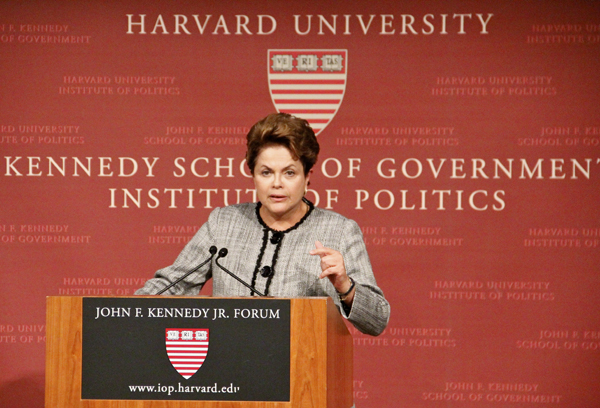Brazilian President Dilma Rousseff Signs Agreements with Harvard, MIT
 Brazilian President Dilma Rousseff speaks at the John F. Kennedy Jr. Forum at Harvard on Tues., April 12. (Photo by Renata Brito)
Brazilian President Dilma Rousseff speaks at the John F. Kennedy Jr. Forum at Harvard on Tues., April 12. (Photo by Renata Brito)
Boston will soon see a little samba added to its stakes in innovation and technology: Yesterday Brazilian President Dilma Rousseff met with MIT president Susan Hockfield and signed two agreements between the School of Engineering and the Instituto Tecnológico de Aeronáutica, Brazil’s equivalent of the Ivy League. Both agreements mark the beginning of future collaborations as well as student, faculty, and research exchanges between both institutes.
“The 21st century is the century of knowledge, and the capacity for each person to do work in the making of a richer world, but also a fairer and more peaceful one. I want to commit publicly and support this partnership, which today reaches a higher level,” Rousseff said.
MIT will hopefully add its currently enrolled 58 Brazilian students, and the ITA, which has an even lower level of admission than MIT (believe it or not), hopes to double its student population through the agreements with MIT.
Rousseff also signed a similar agreement with Harvard’s Drew Gilpin Faust to make a Harvard diploma financially accessible for Brazilian students. During a speech at Harvard’s John F. Kennedy Jr. Forum, she said that Brazil’s growth in the next year will be even greater than it has been in the past two years. Hard to believe? While she admitted there still are many educational challenges and advances needed, she also noted that the program Ciências Sem Fronteiras (Science without Borders) will give scholarships to 100,000 students to study abroad in places like Boston or Cambridge.
At the end of her speech, Rousseff was faced with challenging questions from the audience regarding her view of the Chávez regime and his violation of human rights. A cancer survivor herself, she avoided the question by wishing the communist dictator a fast and full recovery. More disappointing for some was her stance on émigrés in town after one attendee asked how she planned to help young Brazilians living illegally in United States who could not afford higher education and were not eligible for financial aid.
“We have 190 million people in Brazil that I have to take care of. We cannot take care of everything immediately,” she said. “The people who live here have access to other opportunities that my people in Brazil don’t have access to, so I have to take care of them first.” But can you really blame her?


